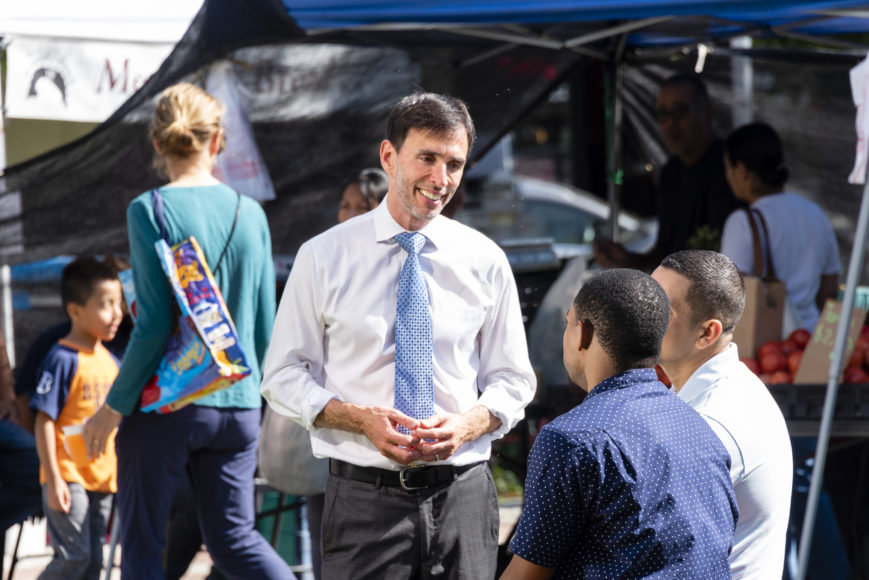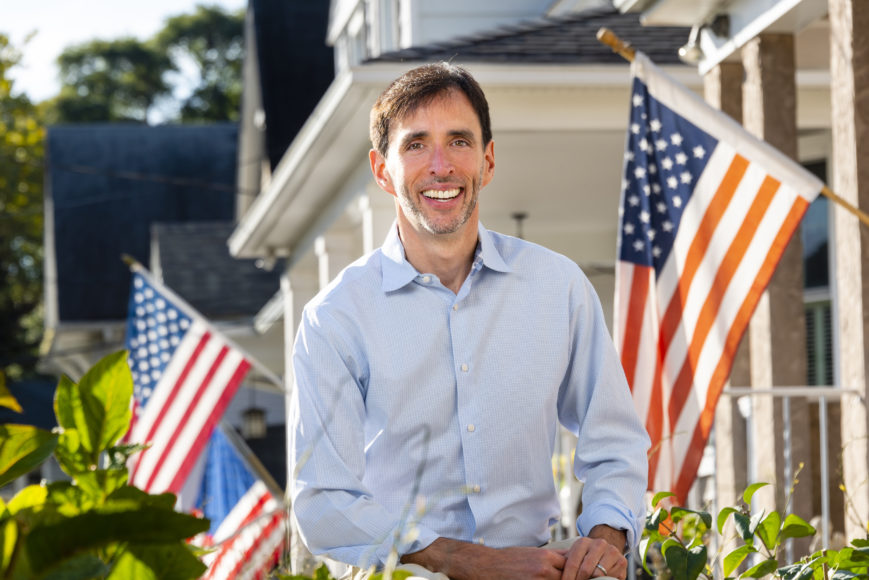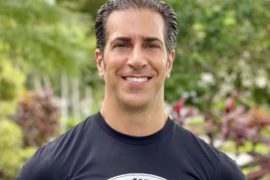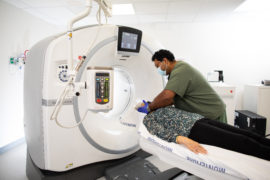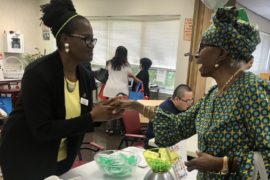For Noam Bramson, being mayor of New Rochelle isn’t just about politics and managing an organization with a budget of $261.5 million; it’s about continuing what can easily be characterized as a compulsion to improve all aspects of life in the city in which he was born, raised and continues to live with his wife and two sons.
Bramson’s wife, Catherine (“Catie”) Stern, is a clinical pediatric neuropsychologist affiliated with Family Health Associates of White Plains and Manhattan. Sons Jeremy and Owen attend the New Rochelle public schools, as did their father. (Bramson not only went on from New Rochelle High School to Harvard University, he earned his undergraduate degree in three years and then received a master’s in public policy.)
Working a mayor’s sometimes long hours in City Hall has not kept him from being active in the community. Bramson is a member of the Government and Finance Working Group for the Regional Plan Association, a member of the founding board of directors of Sustainable Westchester and a past board member of the Westchester Jewish Council. He has served on the boards of the New Rochelle Campership Fund, the now-defunct College of New Rochelle’s Castle Gallery, the Fund for Educational Excellence, the New Rochelle Council of Community Services and the United Way of New Rochelle.
Starting in 1992, Bramson, a Democrat, worked closely with then-Congresswoman Nita Lowey. He began his own office-holding career on the New Rochelle City Council. In 2006, after Mayor Tim Idoni resigned to become Westchester County Clerk, Bramson was appointed to the job and then won a special election to fill the remaining year of Idoni’s mayoral term. In 2007, he won a full four-year term with just under 67% of the vote.
Voter confidence in him has held. In 2011, Bramson was reelected with more than 79% of the vote. Four years later, he received more than 61% of the vote and in 2019 he was reelected with just under 63% of the vote.
“We’re enjoying unprecedented success,” he tells WAG about the transformation and revitalization of the city. “Thirty-two projects approved, 10 completed, 11 under construction with more that are going to begin soon. Their leasing up ahead of expectations really validates the hopes and expectations that the city had when we adopted our downtown framework in 2015 and it positions New Rochelle as a regional leader in smart, sustainable growth.”
Bramson notes that new zoning recently was approved for the Echo Bay waterfront section of the city, which he hopes will unlock the potential of that site.
“This is a point at which U.S. 1 (Boston Post Road) comes extremely close to the Long Island Sound shore and yet as long as I’ve been alive, it has been contaminated and completely inaccessible,” Bramson says. “We’ve relocated our public works operations center from that site. We’ve identified a developer who will work with us to create a mixed-use project with continuous public access to the Long Island Sound. That’s going to be very valuable in and of itself. It will also create a synergy between the downtown and the waterfront for the first time and really strengthen both locations.”
Bramson adds that what was a pioneering concept some years ago — selecting RXR Realty as master developer for the city’s downtown to create its own projects while also working with other developers to transform the cityscape — has sent a signal to the rest of the marketplace that New Rochelle is a good place to do business. (See story on Page 28).
“Transit-oriented development is absolutely critical to our future,” Bramson says. “On the one hand, it is responsive to the kind of lifestyles that the younger generation and future generations expect — less dependency on the car, ability to obtain goods and services nearby by walking out your door. It’s also important from a global perspective, because reducing our dependency on automobile traffic, having lower energy consumption for heating and cooling, is really a vital part of any coherent, effective climate action strategy.”
It looks as if mass transit will play an increasingly important role in New Rochelle’s future as Metro-North begins in earnest its Penn Access project that will allow riders on the New Haven Line serving New Rochelle to access Penn Station on Manhattan’s West Side in addition to Grand Central Terminal on the East Side.
“What’s particularly significant to New Rochelle is that the line between Grand Central and Penn Station splits just south of the New Rochelle station so when this is completed, we will be the closest station to Manhattan with direct service to both the East and West Side,” Bramson says. “That’s a major selling point for both commuters and reverse commuters, and it will help position New Rochelle as a place with unparalleled transit access to the region.”
While acknowledging that the wide margins in his election victories can easily be interpreted as an expression of voter satisfaction with the job he and his administration have been doing, Bramson tells WAG that New Rochelle residents are not at all shy about expressing their opinions.
“Not a day goes by that I don’t hear from residents with a phone call or an email or participation in a public hearing or a neighborhood meeting, and I value that input,” Bramson says. “I think anyone in public life who takes that responsibility seriously always needs to be listening, always needs to be open to the possibility of a course correction, always wants to absorb good ideas and act upon them. At the same time, sometimes leadership involves doing what you believe is right and then being held accountable for the outcome of your actions. So I think most people in public life establish a balance between those two.”
Bramson speaks with enthusiasm about a new approach to generating public input on proposed projects. The city has received a $1 million grant from Bloomberg Philanthropies to develop a new app called NRVR, an augmented reality and virtual reality application that will enable people to visualize new public spaces and new developments and then provide their input on what they’re seeing — their reactions, comments and suggestions.
He says the idea is to go far beyond the kind of dry meetings that are held now for public comment and turn the experience into a fun and creative exercise.
“We’re looking not just to listen to the public, which is important in and of itself, but also to create new platforms and opportunities for the public to contribute in a meaningful way,” Bramson adds.
He describes downtown development as having been a “huge financial winner” for the city government and for the school district.
“The projects that have been approved, if you look at the taxes that have been generated historically and compare it with what will be generated over the next 20 years and over the next 40 years, over the next 20 years it’s a $180 million increase in tax generation and over the subsequent 20 years it’s a $500 million escalation in tax generation,” Bramson says. “Our fiscal bottom line, the health of taxpayers that are already here, will be greatly improved by the growth that is occurring.”
The city believes in its tag line “Ideally Yours,” Bramson says, welcoming people of all backgrounds and talents. He emphasizes the racial and economic diversity of the city as something to be preserved and has been encouraging the development of affordable housing to help do it. The city requires that 10% of new units be set aside at below-market rates. Of the 7,000 apartments that have been approved, he adds, 1,000 are in the affordable housing category.
Open space and construction that is sensitive to the environment are other important elements in the development taking place.
“Sustainability and environmental protection have been core values for the city for quite a long time,” Bramson says. “We adopted a sustainability plan about 10 years ago, which is getting a comprehensive refresh. And, in the context of updating our downtown zoning, we really leaned into environmental principles. We really want to make sure that the environment is not just a rhetorical rallying cry for us but that in tangible, practical ways, we’re making New Rochelle a greener community.”
Bramson says that he’d like to see a future New Rochelle that has preserved the qualities that have made is special, including a talented, diverse population, neighborhoods that are charming and historic and transit assets that are second to none.
“The upside potential in New Rochelle is enormous. We’re a growth stock,” Bramson says. “You can see that because of the changes that are occurring in the downtown area. Our economy is improving, access to goods and services is improving, employment opportunities are improving. So someone who chooses either to invest in a home or invest in a business right now will be getting in at a time when, again, the upside potential is very, very high. Both in terms of the community character, which is something that’s important to me growing up here, raising my own kids here, and in terms of an economic calculus, I certainly would encourage people to look at New Rochelle very seriously.”
For more, visit newrochelleny.com.
The mayor’s team
When Noam Bramson talks about the progress made in New Rochelle, he consistently shares credit with members of the city council as well as City Manager Charles B. Strome III and the rest of the staff. As mayor, Bramson is a member of the council and presides at its meetings. At present, five of the six council members are Democrats and one is a Republican. New Rochelle has a council-manager form of government, with the city manager handling day-today administration and carrying out the legislation and policies created by the city council. Strome — who has been with the city for 33 years, including 20 as city manager — has announced that he’ll be retiring at the end of the year.

